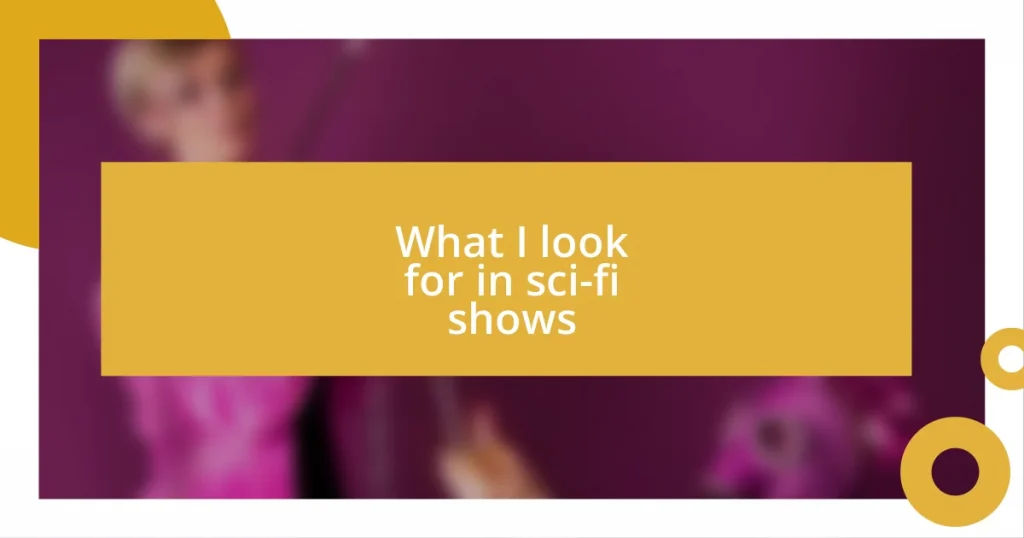Key takeaways:
- Sci-fi series blend advanced science with philosophical questions, prompting viewers to reflect on technology, identity, and ethical dilemmas.
- Key criteria for selecting a sci-fi series include innovative concepts, character development, world-building, relevant themes, and high production quality.
- Shows like The Expanse, Star Trek, and Black Mirror exemplify how sci-fi can inspire social change and provoke meaningful conversations about our society and technology.
Introduction to sci-fi series
Science fiction series have a remarkable ability to transport us into worlds beyond our imagination, often reflecting our deepest aspirations and fears. I remember when I first stumbled upon a sci-fi series that not only sparked my curiosity but also challenged my understanding of technology and humanity’s future. Have you ever found yourself pondering the ethical implications of artificial intelligence while binge-watching a gripping episode?
These narratives often blend advanced science with profound philosophical questions, making them both entertaining and thought-provoking. I find myself captivated by the intricate plots and complex characters that often mirror real-life challenges, such as climate change or social justice. Isn’t it fascinating how these stories can motivate us to rethink our realities and consider the paths we might take?
Moreover, the vastness of the sci-fi genre means there’s something for everyone—be it classic space operas, dystopian futures, or time travel escapades. Each series is a unique portal into untapped possibilities, inviting viewers to explore not only futuristic gadgets but also the very essence of what it means to be human. How has a particular series changed your perspective on life?
Criteria for selecting series
When I think about the criteria for selecting a sci-fi series, a few key elements consistently come to mind. Storytelling is paramount; the narrative should be compelling enough to draw me in, making me care about the characters and their journeys. I’ve experienced series where the story felt rushed or predictable, and I quickly lost interest. So, I always prioritize shows that develop their plots with depth and creativity.
Here’s a checklist of what I look for:
- Innovative Concepts: Presenting unique ideas or twists in technology and society.
- Character Development: Emotionally engaging characters who evolve throughout the series.
- World-Building: A well-crafted universe that feels believable and immersive.
- Themes and Messages: Relevant philosophical or ethical questions that resonate with today’s issues.
- Production Quality: High-quality visual effects and cinematography that enhance the overall experience.
Finding a sci-fi series that meets these criteria often leads to some of my most memorable viewing moments. I recall diving into one particular series that not only had stunning visuals but also delved into deep existential questions, leaving me pondering long after the credits rolled. The right combination can turn an ordinary evening into a thought-provoking adventure.
Character development in sci-fi series
Character development is one of the most compelling aspects of sci-fi series. It’s fascinating how characters in these worlds often undergo profound transformations, reflecting our own struggles with identity and morality. I recall watching a character grapple with their evolving nature as a cyborg, grappling with what it means to be human. That journey was not just entertaining but resonated deeply with me. Have you ever found yourself relating to a character’s struggle to find their place in a rapidly changing world?
As I reflect on great sci-fi series, I can’t help but notice how well they develop their characters in relation to their environments. For instance, in some series, characters adapt to alien cultures or futuristic technologies, showcasing resilience and growth. This mirrors real-life experiences of adapting to change, which can be both inspiring and relatable. It’s like those moments when I had to adjust to new situations in my own life; they made me stronger and more adaptable.
In many sci-fi shows, the characters are not just static figures; they evolve, often facing ethical dilemmas that challenge their values. Watching them wrestle with decisions about loyalty, sacrifice, and love teaches us about our own human condition. I remember feeling deeply moved by a character who had to choose between saving a loved one and doing what was right for humanity—an emotional rollercoaster that made me reflect on my values.
| Sci-Fi Series | Character Evolution Examples |
|---|---|
| Altered Carbon | Explores questions of identity through body-swapping technology. |
| Westworld | Hosts transition from mere entertainment to self-aware entities. |
| The Expanse | Characters grow through their experiences in a politically charged universe. |
Themes in top sci-fi series
The themes explored in top sci-fi series often mirror our own realities, pushing us to reflect on pressing societal issues. One prevalent theme is the impact of technology on human relationships, something I’ve felt keenly in my own life. Remember that moment when we started relying heavily on smartphones? It’s fascinating to see how series like Black Mirror tackle this concern, showcasing dystopian futures where technology becomes both a lifeline and a tether, affecting our emotional connections.
Another theme that strikes me is the exploration of identity and what it means to be human. In Humans, the series dives deep into the lives of synths – AI beings who grapple with self-awareness. I found myself pondering my own identity while watching. It’s alarming yet captivating, isn’t it? To think how our essence might be defined by the connections we build, much like the characters who seek acceptance and purpose in a world that challenges their very existence.
Finally, moral dilemmas often take center stage, raising questions about ethics and the consequences of our choices. I vividly recall a scene in The Expanse where characters had to weigh personal sacrifice against the greater good. It left me questioning: would I have the courage to make such tough decisions? This intersection of personal and collective responsibility is what makes these series so compelling; they don’t just entertain—they push us to examine our convictions and the world around us.
Impact of sci-fi on culture
The influence of sci-fi on culture is profound and multifaceted. I remember discussing how series like Star Trek not only provided entertainment but also envisioned a future where diversity and cooperation triumphed over conflict. It genuinely sparked conversations among my friends about what our world could look like if we embraced these ideals more fully. Have you ever felt inspired by a show to dream bigger about our society?
Moreover, sci-fi often serves as a catalyst for social change, prompting us to critically assess our current realities. For instance, think about The Handmaid’s Tale—it magnifies the implications of political power and gender roles in a strikingly relatable way. I found myself reflecting on my own belief systems, considering what I would do in a society where freedoms are stripped away. It’s unsettling yet necessary, pushing us into deeper conversations about rights and individualism.
Culturally, these narratives challenge our perceptions of the future and motivate innovation. When I watched Black Mirror, it made me rethink the trajectory of technology and its ethical implications. The series presented scenarios that felt alarmingly plausible, prompting me to engage in discussions on ethical tech in my workplace. Isn’t it eye-opening how a show can transform our views and inspire action? Sci-fi doesn’t just tell stories; it shapes our understanding of what could be, urging us to participate in creating a better world.
Conclusion and recommendations
Reflecting on my journey through the best sci-fi series, I can’t help but recommend diving into The Expanse. It’s not just a show; it’s an experience that melds intricate storytelling with real-world implications. Each character’s struggle reveals something deeply human, making me question what I would do in their positions. Have you ever lost yourself in a narrative so gripping that it changes the way you view your everyday choices?
For those new to the genre, Star Trek is a must-see. It offers a hopeful vision of the future that could inspire anyone. The themes of cooperation, exploration, and understanding resonate with my personal desire for a more united world. Remember the joy of watching shows as a child that transported you to different dimensions? I feel Star Trek captures that essence beautifully, encouraging viewers of all ages to dream and discuss what’s possible.
Finally, if you’re ready to confront more challenging themes, I highly recommend Black Mirror. Each episode serves as a mirror reflecting modern society’s reliance on technology. I’ve watched it with friends who admit it leaves them a bit unsettled, which is precisely its power. How often do we get a chance to question our relationship with technology? These series not only entertain; they provoke thought and inspire meaningful conversations long after the credits roll.












